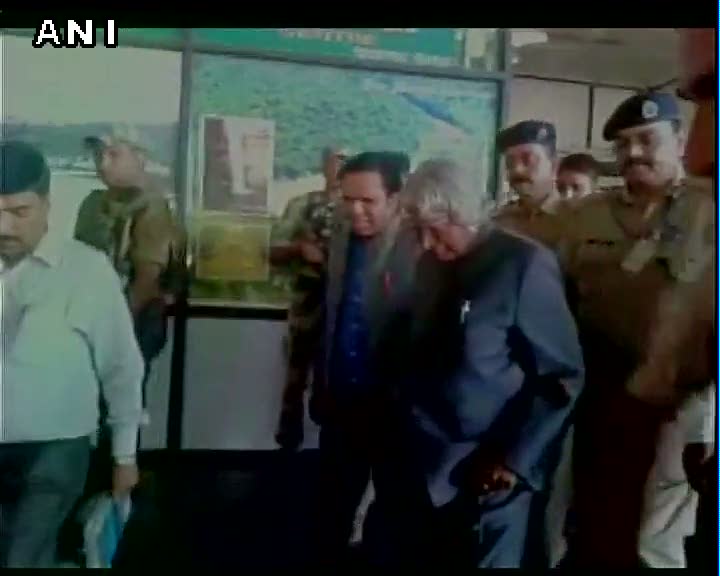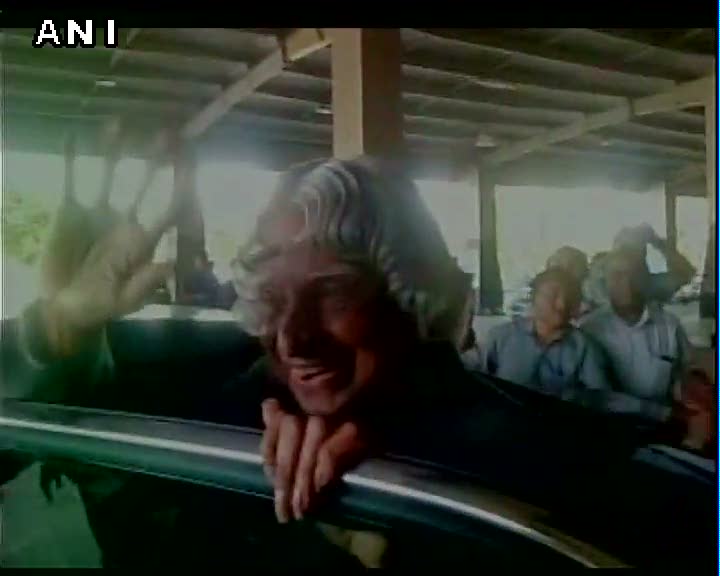Former President APJ Abdul Kalam passes away after suddenly collapsing in Shillong
Kalam was admitted after he suddenly fell ill at an event in Shillong

Shillong: Former President APJ Abdul Kalam, the 'missile man' who came to be known as 'People's President' died on Monday after he collapsed during a lecture at the IIM on Monday evening.
Kalam, who would have turned 84 in October, was confirmed dead more than two hours after he was wheeled into the ICU of Bethany hospital in a critical condition following the collapse at around 6.30 pm.
Considered the most popular President, Kalam became the 11th head of the state and occupied the post between 2002 and 2007 but lack of consensus denied a second term in office for a man who came from outside political spectrum.
Meghalaya Governor V Shanmughanathan, who rushed to the hospital on hearing the news of his admission, said Kalam died at 7.45 pm. Despite medical team best efforts, he could not be revived.
Chief Secretary P B O Warjiri told reporters outside the hospital that he had spoken to Union Home Secretary L C Goyal asking for necessary arrangements to be made for carrying Kalam's body from Guwahati to Delhi tomorrow morning.
Read: A life well lived: Remembering Dr APJ Abdul Kalam
"The former President has been admitted to Bethany hospital in a critical condition," M Kharkrang, SP Khasi Hills said earlier.
Doctors from the army hospital and North Eastern Indira Gandhi Regional Institute of Health and Medical Sciences (NEIGRIHMS) rushed to Bethany hospital but their efforts proved to be of no avail.
A seven-day national mourning will be declared by the Centre, Union Home Secretary L C Goyal said. Both the Houses of Parliament are likely to make obituary references and adjourn as a mark of respect to his memory.
Avul Pakir Jainulabdeen Abdul Kalam rose from humble origins to become the President in the most unexpected manner during the NDA government under Atal Bihari Vajpayee after an all-party consensus minus the left parties that saw him through in an election, which he won handsomely.
Read: RIP APJ Abdul Kalam: Pall of gloom descends on Rameswaram, his native place


Earlier today (3 pm), Former President APJ Abdul Kalam walking out of Guwahati Airport. (Photo: ANI Twitter)
An aeronautics engineer from Madras Institute of Technology, Kalam was considered the brain of missile programme in India got and as Chief Scientific Adviser to Vajpayee was also instrumental in the Pokhran nuclear test in 1998.
As President, Kalam utilised any opportunity that came to him to address students, especially school children, to dream big so that they became achievers in life.
Read: Tributes flow in for ‘Missile Man of India’, Dr APJ Abdul Kalam
A bachelor, the former President was a veena player and was deeply interested in Carnatic music. He was vegetarian all his life. During his tenure as President, Kalam came up for criticism for his inaction in deciding the fate of 20 out of 21 mercy petitions.
Kalam acted on only one mercy plea in his 5-year tenure, rejecting the plea of rapist Dhananjoy Chatterjee, who was hanged thereafter.
He anwsered critics over the delay in deciding on the mercy plea of Afzal Guru, who was on the death row after he was convicted of the terror attack on Parliament, saying he had not received any papers from the government. Guru was subsequently hanged.
Kalam also faced criticism over his assent from abroad to the controversial decision to impose President's rule in Bihar in 2005. He, however, sought to dismiss the criticism, saying he has no regrets.
Kalam on one occasion showed that he too was not a rubber stamp-like Constitutional head by refusing to approve the Office-of-Profit Bill. It was an unexpected response that sent tremors across the political establishment, especially the ruling Congress and its leftist allies.
The next day, Prime Minister Manmohan Singh was left to explain the matter to the President and somehow get his consent for the Prevention of Disqualification (Amendment) Bill 2006.
Read: When a lecture on the seashore gave Kalam his aim in life
Known for his unique interactive skills, Kalam made it a point to involve students in his speeches and lectures irrespective of their age-group. After the lectures, he would often ask students to write to him and he did not fail to respond to many messages that he got.
For his contribution to the missile programme, he was awarded with Bharat Ratna, the highest civilian award in 1997. He was also awarded Padma Bhushan in 1981 and Padma Vibhushan in 1990.
Post-presidency, Kalam worked as a visiting professor at Indian Institute of Management Shillong, Ahmedabad and Indore and several research and academic institutions across the country and world.
He authored several books with the 'Wings of Fire', 'India 2020' and 'Ignited Minds' being the most read best-sellers. Kalam's father owned boats, which he rented out to local fishermen, but he himself began his career as a newspaper vendor.

